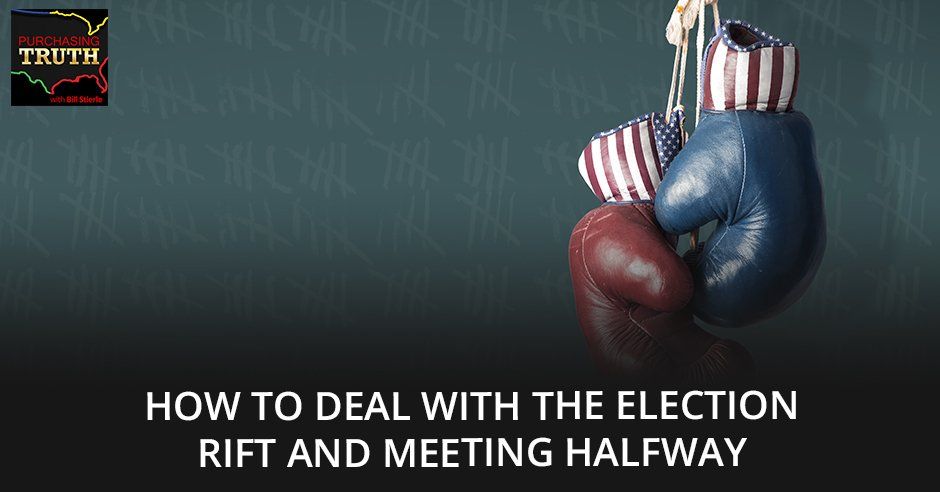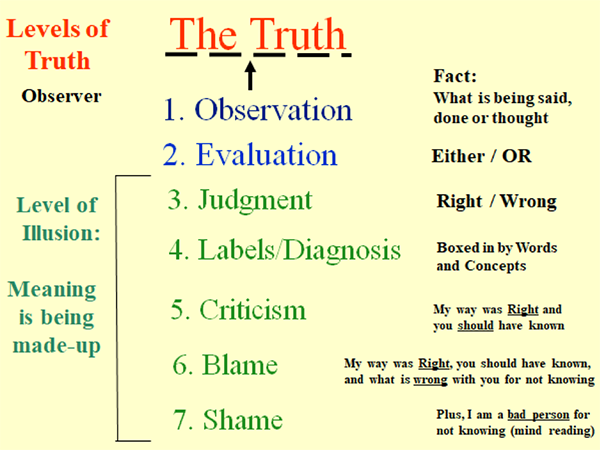How To Deal With The Election Rift And Meeting Halfway
Subscribe Today!
As history has proven every time, the election has caused a massive and significant rift in America, from people’s attitude with others to the certain values they uphold. With the Democrats and Republicans divided from each other more than ever, meeting halfway has been challenging but still possible. Join Bill Stierle and Tom as they discuss how people can still agree on the most sensitive topics today despite their political differences. They also delve into the contents of the article No, I Will Not Meet You Halfway, You Must Change, and how adding even a single paragraph can change its aggressive tone to an emphatic one.
---
Watch the episode here
Bill, last time, we were talking quite a bit about the truth scale and that’s always a helpful thing to revisit once in a while, especially when we are faced with a lot of disinformation, misinformation and a lot of what we’re seeing since the election. I know that you’ve had some experiences with people you’ve had discussions with either in interviews or comments on those interviews, which has revealed some interesting things about how some Donald Trump supporters are feeling and seeing things. There’s a great opportunity for us to discuss this and share it with our audience.
I appreciate that, Tom. I am a person that steps into difficult conversations and taking the time to be compassionate and empathetic for different people’s positions. When we talk about freedom of speech, we don’t have any control over what comes out of somebody’s mouth, but we do have control about how we take it. We also have control about what we say next. If we’re in a responsive nature, then there’s a reactive nature. It doesn’t go as well. The reactive nature clearly doesn’t go well, but the responsive nature or if we pick one of the four horsemen, criticism, defensiveness, contempt and withdraw, it does not go well. If the Press Secretary gets asked a question and says, “Do you have evidence?” She doesn’t answer the question and she says, “We need patience.” She’s asking for empathy. She’s stuck.
“Kayleigh McEnany, you would like us to hear that there is evidence. We just have to go find it.” Is that right?
She would say yes because she has to. I would add this empathy sentence. It would sound like this, “I’m guessing you’re feeling torn, and a part of your administration isn’t fully sure if there is voter fraud. You’re making sure that there isn’t voter fraud because voter fraud is something that your administration is promoting at the current time. Is that correct?” She has to say yes because that’s what she’s doing. “It’s hard for the possible reality to set in that the vote did not go for your candidate and did not go in the way that the president would have liked. I’m guessing you’re a little torn and hesitant to give us a straight answer when you don’t have any evidence at this time.” “Yes, we need patience.”
I’m having deja vu to the early 2000s when I heard people saying, “We’ll find the mobile biolabs and the weapons of mass destruction in Iraq.” I know it’s not the same thing. We’re talking about votes in an election, but in terms of we need to find it.
After the wreckage has taken place, money that has been spent, troops that have been deployed, lives that have been lost he says, “We didn’t find any.” Even as I spoke that way, I felt hollowness and great sadness for all the loss of life. Now it’s on for both. If they would’ve sold it, we have this bad guy that’s redoing bad things to his people, so we’ve got to get rid of him instead of the nuclear weapon that they went after. That’s one thing because then it would be the coup or the situation in Panama where we took out their leader because he was allowing the drug trade to move through Panama in an exposed way, and taking more than his cut.
It’s interesting how different that is from going after Osama bin Laden who did something admittedly and was proud of it that caused the loss of so many lives. We went and took him out when we could find him. Let’s come back to the Donald Trump voter and the reality of where we are. Let’s tie back to the truth scale with some of the experiences that you’ve had. Can you share with us and set up why you were feeling we have some new perspective on the Donald Trump voters?
The new perspective on Donald Trump voters. If you think about the no-win, these are the reasons why I cannot vote for Joe Biden, and it’s a deal-breaker. There’s no way I can vote for Joe Biden. My sister is in this group. I feel strongly about abortion. It is immoral. I cannot vote for someone who would make abortion more available. That’s her point of view. I see that point of view. You can’t vote for somebody who is going to make the thing that you’re going to fight your life for. You’re not going to do that.” That’s one. There’s a dozen of these easy.
I feel strongly about Israel, it’s identity and safety. I cannot vote for somebody who I believe will strengthen Israel’s enemies and strengthening the loss of its existence. Donald Trump followed the law. There was a bill that was passed that the embassy was to move to Jerusalem. He followed the law and did what the law told him to do. He didn’t stay in the middle. He didn’t do what other politicians have done in the past which is, “I’m going to say some nice things but we can’t do there because as a world leader, we looked like you were picking sides.”
Donald Trump is not one to avoid picking sides.
We don't have any control over what comes out of somebody's mouth, but we control how we take it.
CLICK TO TWEET
He is not and people appreciated that. Therefore, that deal breaker mindset regarding Israel is he did what? It was passed that Jerusalem is where the embassy belongs, not in the other city.
This had been going on for many administrations. This is something that had been hanging out there and not acted on for a long time.
The evening press struggles with covering nuanced and difficult issues without taking a side. You can get to it a little bit better in a longer format show like 60 Minutes or you can get into a documentary that you can swing in, “Here are the 2, 3 or 4 different ways to look at this.” You’ve got a bit of time to do it, but to get it into soundbites is very difficult. A lot of the shows are written for soundbite consumption. Tucker Carlson is going to dynamite that. He’s going to come up with something. His team and his writer are going to come up with something that is a deal-breaker mindset, real or distractionary. They’ll say, “What are they doing now? That’s crazy that they’re doing that now.”
The biggest problem for the 24 cable news networks is Joe Biden is not going to give them much red meat to chew on. Donald Trump gave them tons of red meat to chew on. Every day was a buffet of tweet, nuance, stepping foot in a pile of crap, cleaning up the pile crap without cleaning up the pile of crap, stepping a new pile of crap upon the new pile of crap. The pile of crap looked like it got cleaned up, but it didn’t get cleaned up like impeachment. There’s no consequence. There’s no center, “So what you did this? I won by one vote. I won because the Senate wouldn’t do it, therefore I won.” Now that he’s lost, he’s going, “I won. I’ve made up a new reason why I won.” It’s a new set of red meat. It’s very challenging and interesting.
We have the 70-plus million people who voted for Donald Trump. It seems that they appear to be in 1 of 2 different states with their feelings. Those are what we’re seeing them expressed. They’re either fighting it because they’re in denial that they lost the election and the votes went for Donald Trump. They’re fighting that saying, “We need to recount.” They haven’t accepted that Joe Biden won, or they may have been resigned to it or have accepted that he won, and there appear some fears. To explore that a bit might help us have a little more empathy for the Donald Trump voter.
Fear and hate were two emotions that are essential for us as human beings. There’s an article that I’ve written, how to diffuse hate and anger, and using empathy to do that. Anger is like a flame thrower, whereas passion is like a laser. Donald Trump even had that quote. He says, “I have a lot of passionate people that are behind me.” He calls them passionate people but he feeds them lines that generate anger inside them, not active passion inside them. What winds up happening is anger is usually met with anger. Passion is something that you’ve got to focus if you want passion to work. Anger is getting a bunch of people walking away from you.
Passion is going like, “I would like to do something about the abortion rate in the United States. I would like to cut it into half.” “You would?” “Yes, because I respect life. I don’t want women and the unborn child to go through that. It’s not moral.” “You’d like to cut it in half?” “Yes.” “I would like to cut it in half too.” “What are some things we could do to cut the abortion rate in half?” What we would need to do is have more sex education classes because the studies have shown if you use and you talk about sex, young children and young teens go, “I am not going through that. I am not going to carry a damn egg. I am not going to take care of a child. I am not going to the doctor’s office. I’m not going to have someone put a tube inside me to have a baby.”
Their awareness is going like, “I am now aware that this act of sexuality is going to create a child and the full consequences that go with it.” In sexuality, during the making of it, the rational mind doesn’t work all that well. On my scale of truth, Tom, I moved up away from criticism, blame and shame. I walk all the way up. I avoid labels and diagnosis, the judgment of right or wrong. I am observing what the truth I would like to see. I would like to see the abortion rate to be cut in half. I would like clinics to shut down. “You would like clinics shut down? How about take away their customers? How would you take away their customers?” Early sexual education.
The point that you make is there are maybe things that people disagree on, whether abortion should be legal, illegal, restricted more or not.
You’re then already after it. It clicks you out of your ability to have a choice and consider the financial impact of this situation. You may have noticed this but there have been years of the war on drugs and we can’t even keep drugs out of prison. It doesn’t matter the size of wall you bring.
Empathy must always come before problem solving, as this will bring a clear issue to the truth.
CLICK TO TWEET
That’s part of it too. Even if you make abortion illegal, we know from history that abortion is still going to happen. Let’s not argue where we are not going to agree. We can go to a place where we do agree. Let’s prevent unwanted pregnancies and that meets everybody’s needs. That’s an interesting way to look at that.
I’ve said this many times on our shows. It’s empathy before problem-solving because empathy will bring a clear issue to what the truth is. That’s the thing to get ahold of. That’s what tells you where truth lies, exists, or where the foundation of truth is.
Let’s not confuse truth with lying. That was unintentional. That is fantastic, Bill. That’s apropos to what we’ve been talking about the levels of truth. Empathy can reveal where truth is. A lot of Donald Trump supporters are fearing things they don’t need to fear. I didn’t have that perspective myself about what they may be fearing. It’s important to understand that. Somebody who fears what’s coming with the new administration reached out to you and sent you an article because they saw you speaking on a live Facebook broadcast.
That article is valuable. The title of it goes, “No, I Will Not Meet You Halfway, You Must Change.” Meeting somebody halfway can be a non-starter in a communication when somebody says, “Nazis are on my side and I’m going to support Nazis.” That is a non-starter for many people in conversations. I will have an intelligent and respectful discussion with you about immigration policies, but I am not going to discuss with you if you’re going to say, “This ideology is to be applied to immigrants.” We’re not doing that. In other words, there is a request for the work to be done. It’s the same thing with things on the left side of the fence like climate change. I am willing to discuss with you the reduction and the realignment of the fossil fuel industry.
I’m interested in discussing with you about how that is going to grow and change. There are a lot of businesses that go out of business. I’m not seeing too many horses and buggy manufacturers because we have cars. There are certain industries that through time are not being used anymore. It might not be this 2020 but not in the next 10 or 20 years. There needs to be a movement towards something that we are measuring called CO2 in the atmosphere. You can come up with a massive CO2 extraction machine, then you get to pollute and take it out, and try to get to zero carbon emission that way. Good luck with that. If something isn’t made for something, it’s hard.
When California has taken the steps to be electric in the next twenty years, no fuel cars, that great economic strength that California has, and to make that a thing. “Electric cars, California. You can’t use gas cars here. Sorry, this is our environment. Gas cars can’t come.” There can be and there may be certain cars that get an exemption. There are going to be cars made from the ‘50s, certain ages or classes of cars, but it’s not going to be maximum. It’s going to be negligible, something the environment can handle. We need to stare down these issues in a way that’s saying, “There’s a third option.” People say, “There’s not a third option for abortion.” The answer is, “There is. You want to make it as minimal as possible and not run over somebody’s need for choice all the time.”
This is the thing that’s illuminated as we look at this article, No, I Will Not Meet You Halfway, You Must Change. This is an article written by the perspective of someone on the left. No question. It is somebody who had enough of the Donald Trump presidency and everything that’s going on. He’s viewing Donald Trump’s supporters in a certain way. He has a perspective and biases about them. To be clear for everybody, there is no empathy in this article. It’s a letter, “Dear Donald Trump supporter.” He’s writing to Donald Trump’s supporters. He’s stating, “I’ve had enough of this. You believed that I’m willing to meet you in the middle if you do this.” To me, in some ways, it’s a power over narrative.
It’s a deal-making narrative.
This person is a Donald Trump supporter who saw you in a live stream interview on Facebook and sent you this article. He appreciated what you had to say, but he seems to express fear that everybody on the other side feels the way the person who wrote this article did. That is the danger because that’s not high on the truth scale either.
Many deals are in judgment evaluation pieces. The way I like to take a look at these kinds of communication things is called, this is a good starting place. An article like this is a great starting place because as you read it once, twice or three times, what winds up happening is your body starts to move to a place of observation if you allow it to. If you don’t let your biases, beliefs or fossilization of thought take over, you’re in good shape because you cannot support crazy people owning a perennial arsenal of military-grade weapons. I cannot meet you halfway by saying it’s okay to own a street sweeper guns as long as you promise only to shoot 100 rounds per day, max. I’m not supporting that.
You can use that weapon under conditions, but we can’t allow every person to have it without vetting somebody about keeping it about a person that’s a bit unstable. It’s not a good idea to sell them that thing. The needs of the many need to be met over the needs of the few, when the needs of the many might get killed by that thing that you’re asking us to do. That’s one thing if you’re doing something that’s not going to affect anybody at all, but if you’re doing something that’s going to take the life of another person, that’s a deal-breaker. I can have a discussion with you about gun policies, hunters, sports shooters and hobbies. Eighty percent of Americans have already come to terms with this particular issue. Twenty percent of the Americans do not do this, so the needs of the few over the needs of the many are going to be upsetting.
Even though those numbers are 80% and 20%, the vote doesn’t fully show that because people are voting for these other deal-breakers. They’re voting for Donald Trump for abortion. My sister will not agree with the weapons piece. She lives in Florida. She saw the damage to the high school. She’s in a double bind, “How can I vote for this person if my number one item is abortion?” Even if her number two item is gun control because all of those poor children and those families that were ripped apart through the death of that shooter coming into that school in Parkland, she still got to vote for her number one thing. She can’t even get to the number two thing. She can’t click down and go and like, “I’m with Joe Biden on this one.”
That’s the thing that is hard to try to get somebody to move off of that one big issue. To get to the point where we can collaborate, cooperate and make some progress on things. She’d like to get to doing something on gun control, but she’s not going to help that happen because of this other one issue. The reality is we have such a conservative Supreme Court. Abortion is going in her direction one way or another regardless of who’s in the White House for a while, but she’s not going to see it that way. That gets difficult when you have somebody who is a one-issue voter.
I would imagine if I took this list of deal-breakers and handed it as a checklist to a Donald Trump voter. They would click yes for this one thing, and the other one or almost all of them might be no. They’re looking at it and go, “That’s the one reason why I’m doing it.” They’re looking at all the other things that they’re letting go of, there would be an adjustment. We talk a lot about language perspective on this show. The perspective shift is you’re voting for this one thing and you’re throwing seven things under the bus when you’re doing that. Certain people can see that nuance and be able to wrestle with, “I can’t go with this other one. I would like the tax cut that Donald Trump is proposing, but I can’t go with that because here are seven other things that I’m voting on this side. I want the one thing he has or the Jerusalem thing.” Somebody may say, “I’m a feeling appreciative. We voted on it. We moved it there. He did what he said he was going to do. The religious people were happy about that and I’m happy about that too.” What happens is we get caught here.
As people weigh all the things that are important to them, not everybody gives them equal weight. There’s different proportionality as to what they feel is going to influence their vote. Even beyond the vote, the fear that many people have of Joe Biden’s presidency, I don’t think it exists toward the top of the truth scale of observation and evaluation. It lives down further in illusion or worse on the truth scale.
On the true scale, the illusion starts coming up strongly when we get into blaming, shaming and labels. The illusion is I know something instead of I am observing something. Our different concepts don’t help us all the time because they’re not black and white. They have nuances to them. When Sigmund Freud first put the term neurotic into the psychological lexicon, they have different neurosis and then it’s like, “That person is neurotic.” You had to ask, “What kind? Are they OCD? Are they narcissists?” I started with another group of labels, “They’re ADD. No, they’re ADHD.”
This article, I Will Not Meet You Halfway, is not helpful here. It reveals the author who is on the left side of the political spectrum. It has labeled and diagnosed the Donald Trump voter repeatedly in this article.
It’s called a starting place article. It’s one that can engender and give fresh language to saying, “I’d like to talk to you about Nazi thing.” I’ll talk to you about immigration but I am not talking about the Nazi thing. It tries to toggle the person at least a little bit towards the middle. It’s not empathy for the person who gets their needs for community met with a group of people that have the same pain that they do. It happens to be under a Nazi flag. I’m not justifying it all. I’m just saying, if you don’t have a strong identity, any identity will work. We might as well make that a tweet. It’s like, “This is my tribe. These are my people. This is where I feel better. I don’t feel so good with this type of faith. I’m going to try this type of faith. It’s still Christian, but I get more motivated in this church versus this church.” Go for it. That’s your belief structure. Hang with it. You’re picking one group over the next, but you can’t go to the other group and say, “Sorry, your type of worshiping is not going to work. I’m going to do everything I can to take your rights away.” That’s not what we’re working for here in America. We’re working for inclusion which is one of those difficult things.
When we pursue truth, we want to stay as close to observation and evaluation as we can. What did the person say or do? Before we get to judgment or problem solving, we want to apply empathy to make sure that we know what truth we’re talking about. This is important for media people too. It’ll keep interviewers tighter to what the issue is and not shift from this issue plus this issue to this issue, then they’re riling up their base because that’s a part of it too.
They’re riling up their interview subject who then isn’t going to give them a productive answer that gets anywhere near truth.
They’ll click into defensiveness, criticism, withdraw and contempt. Contempt sentence is one that Donald Trump uses. Those Democrats, he’ll do criticism, then he’ll have a bitter contempt as he talks about it.
He says to women, “You’re a nasty reporter.” It’s what he says. It’s contempt, no question. The article would have been much more productive if the author approached it from a perspective of wanting to have a real discussion with people that have different beliefs and opinions than they do. Had they approached it with empathy instead of this power over narrative. It seems the rhetoric on both sides is still high. We’re not getting to that place yet where we can have restoration and real discussions that are safe.
I appreciate that, Tom, because you gave me an idea about what would work with this article. The way it’s written is paragraph one is the setup of the thing that is called the deal-breaker. Paragraph two is what the power over or the demand is that’s going up. What’s missing as a paragraph in between those two things that says, “I know what you’re going for over there. You’re going for X, Y and Z. I’m hearing you fully that’s one of the things you’re going for. This is the thing I’m going for and this is the way I’d like to speak about the subject that you’re speaking about.” There is a bridge paragraph that could be inserted in between each one of these paragraphs that would be helpful to restore the nation. That could be the life-serving communication for both of the listener and the speaker between both Republican and the Democrat or the non-voter that’s in pain with this issue. Why do people not vote? How many people do we have vote? Over half the nation or thereabouts.
It looks like 150 million people or so will have voted in this, maybe 325 million. It’s close.
They’re sitting on the fence. The reason why the voters are not doing that is because they don’t want to face these difficult narratives and they don’t like each one. They rather withdraw, meet the need for emotional safety, throw all the ballot stuff in the garbage can, and know that I don’t like either one of the decisions because I don’t want to think about the difficult in-between empathy. I’m in pain about it because I’m being impacted by these two groups that I don’t even want to think. There is a lot of helplessness that’s even underneath the anger and the hate that both sides have in part with each other.
It’d be good to have a conversation next time about truth and how to have safe and productive conversations at the Thanksgiving dinner table. What do you think about that?
That’s a great idea. You’re reading my mind because I’m thinking, how do you have a healthy discussion over Thanksgiving if Uncle John or Aunt Sally starts into a narrative about it’s not right to kill a turkey and stick it on a table?
If somebody says, “I can’t believe it. Now that Joe Biden is in office, the government is going to come and take away our guns,” something like that.
What do you say next? That’s a great one, Tom. More to come on this. Thanks.
Thanks so much.
Important Links:
Love the show? Subscribe, rate, review, and share!










